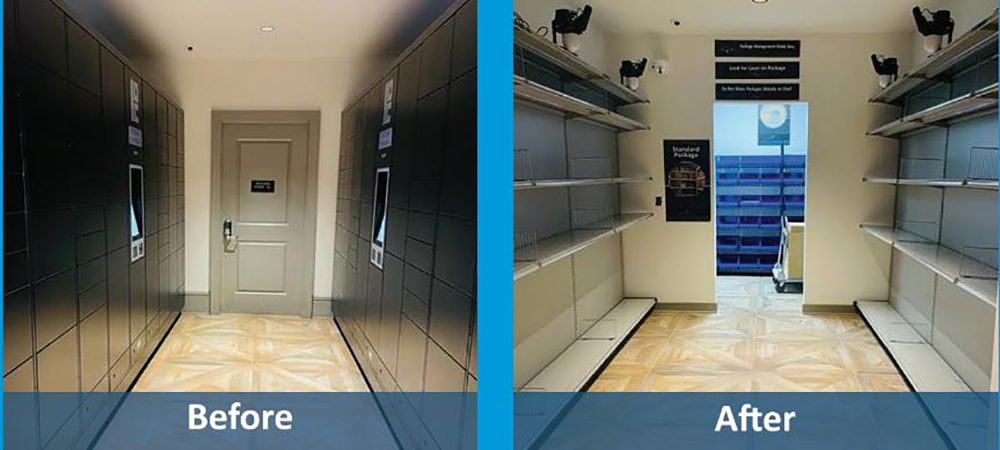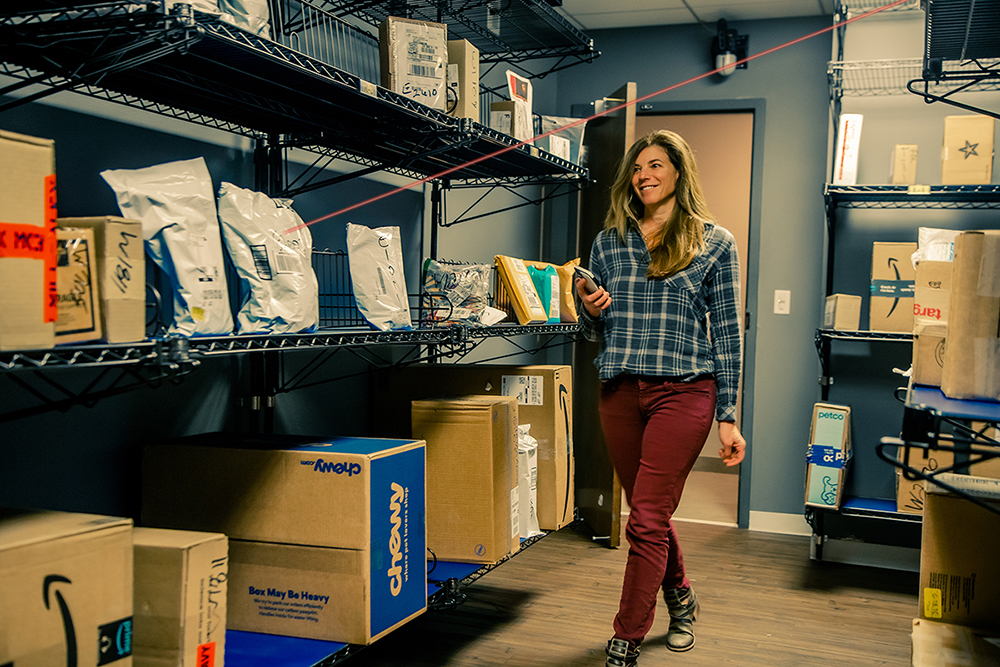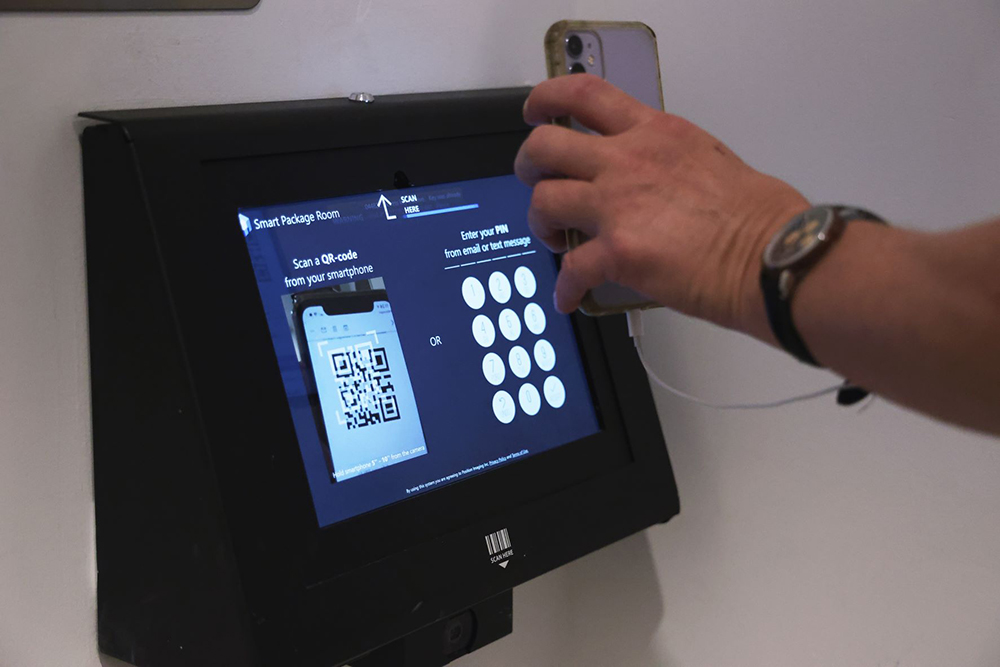|
Getting your Trinity Audio player ready...
|

By Ned Hill, Position Imaging
The historical volume of packages gets all the multi-family press. But volume isn’t the actual property owners’ problem. Instead, their big problem is figuring out how to manage a shift in package management preference; e.g., residents and managers find that existing locker systems are inadequate for package delivery and distribution. And for a good reason. People now request a staggering range of goods be delivered to their homes, from car parts and carpets to dining room tables and the dinner served on them. The shipping industry excels at accommodating in many areas, but it serves single-family, porch drop-offs better than multi-family deliveries.
How is a Locker System to Cope?
The problem is that lockers, by design, are too inefficient to keep up with today’s delivery needs, and—multi-family residents are unhappy about it. Lockers can neither expand to accept oversized deliveries nor shrink to more efficient space utilization. Instead, they force “spill-over” into insecure, unmanaged areas. Unpleasant heaps of bags, boxes, and stray styrofoam package peanuts overtake beautiful lobbies and common areas.

The new residential delivery state of affairs requires a dynamic, intelligent infrastructure. The type of package management system required to meet renters’ needs consistently favors intelligent package rooms that optimize the process. For example, unlike the lockers with fixed-sized storage compartments, intelligent package rooms provide shelving to accommodate packages of any size or shape, staging areas for substantial items such as furniture, and even cold storage areas for perishable food.
All packages—regardless of size or location—are tracked and monitored in an intelligent package room via advanced Computer Vision technology. This cutting-edge technology has the intelligence to associate every item with its specific owner. In addition, it will notify residents if they accidentally retrieve the wrong package and try to leave the area.
ADVERTISEMENT
Intelligent package rooms are designed to fit within existing or former locker spaces but with more functionality. Cameras and sensors monitor the placement and movement of every package to ensure security and chain of custody. Lights and laser pointers guide residents to their packages so they can quickly and accurately locate their items. As a result, any package can be placed in areas designed to accommodate them safely and efficiently.
With intelligent package rooms, food and dry cleaning deliveries can be accepted, virtually without oversight, via new “smart clip” technology. These smart clips are small devices attached to any loosely packaged object. When residents enter the intelligent package room to retrieve their items, they simply scan a QR code from their notification text or email. The smart clipped item flashes in the staging area for instant identification. The clips are embedded with an accelerometer that detects motion; if the item’s movement is not associated with the item’s owner (the proper QR code) or the clip is removed, a notification alarm will alert the person they have retrieved the wrong thing. In addition, smart clips also monitor the temperature to ensure perishable items stay fresh.
Adaptive Package Management

Package room technology will adapt to buyers’ preferences and property owners’ needs. This flexibility is possible because of Artificial Intelligence (AI), the technology supporting advanced Computer Vision. These technologies present massive processing efficiencies behind the scenes to optimize the package management process to benefit all multi-family stakeholders, such as property owners, managers, and tenants.
Masking the operational difficulty saves property management money while improving the property. Intelligent package rooms require little to no training, and the engagement is intuitive. Couriers delivering packages scan each item in the intelligent package room, just like they would at a single-family unit. Residents receive an instant text notification with a QR code to enter the room.

In addition, intelligent package rooms enable residents to retrieve belongings on their desired schedule. The room’s security features remove the need for any building personnel to be on call to assist residents. It’s a 24/7 convenience that keeps food cold and watches over packages until the owner retrieves them. However, if the wrong item is taken and the alert alarm is ignored, there is a digital breadcrumb trail of everything in the room. In the event of a missing item, building management can check the log files to ascertain precisely when the package was removed and by whom because all activity in the room is digitally recorded.
Intelligent Package Room Designs Replace Lockers and Add Revenue Opportunity
Unused storage areas or oversized closets make great candidates for intelligent package rooms. Many locations have converted existing space, especially in space-confined buildings in New York City. In NYC, real estate owners are retrofitting current areas into intelligent package rooms and generating additional revenue via increased rents for added convenience. In addition, architects are now including intelligent package rooms in their building designs. Building owners and managers now realize that providing their residents with an intelligent package management solution is an amenity they certainly can turn into a revenue source.
ADVERTISEMENT
Conclusion
Legacy locker-based systems can’t process today’s package volume coming into multi-family units. The plausible solution is AI and Computer Vision technologies; once at work only in high-end computing, now delivering a modern-day convenience for intelligent package management. When deployed as an intelligent package room, property owners provide a best-in-class experience with the following:
- Intelligent in-room tracking and notification with little, if any, supervision.
- Smart clips that watch over perishable food items ensuring their freshness.
In addition, intelligent package rooms can be installed in only weeks, often within what used to be the locker system area. Today, many architects include intelligent package room designs into new multi-family building specifications as a competitive and convenient enhancement.
Ned Hill is the founder and CEO of Position Imaging (PI), a pioneer in the field of advanced tracking technologies. Under Ned’s strategic vision and guidance, PI has developed an industry-leading tracking solution, utilized computer vision and laser guidance to simplify item delivery, and created unique AI-based technologies. These combine to improve logistics efficiency and continuous visibility of items at any stage in the process. Ned has raised close to 20 million in funding, driven product development, and created a partner ecosystem of industry leaders in hardware (Hitachi-LG Data Storage, Intel), software (Microsoft, Salesforce), solutions (Zebra, Lozier), and service (Bell and Howell). Ned is the inventor or co-inventor of over 50 patents/patent applications and a speaker at industry conferences, including CES, Live Free, and Start, and at MIT.
Learn live and in real-time with Realty411. Be sure to register for our next virtual and in-person events. For all the details, please visit Realty411Expo.com or our Eventbrite landing page, CLICK HERE.


